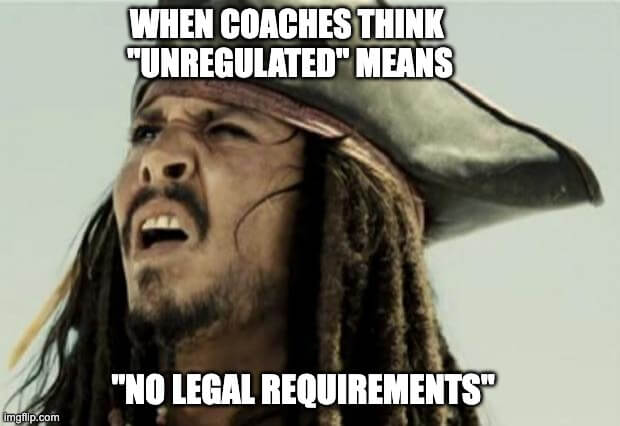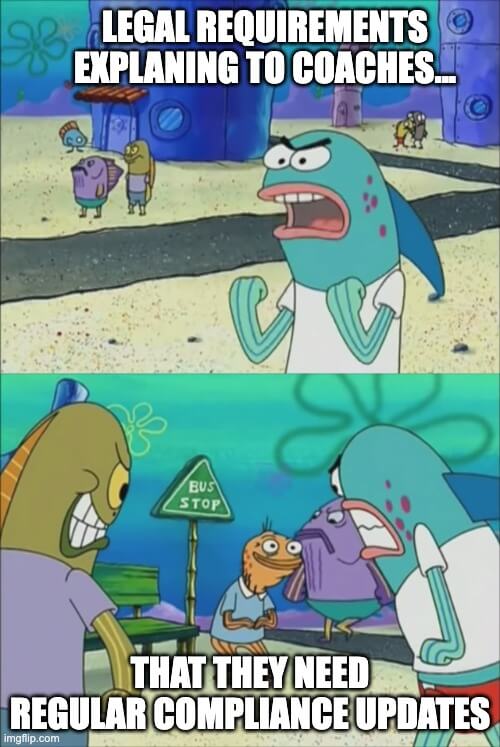Let’s begin with the most practical tools you can use right away.
Legal Requirements Checklist
1/ Business Formation
| Requirement | Details | Priority |
|---|---|---|
| Business Structure | Choose between sole proprietorship or LLC | High |
| Business Name Registration | Register your coaching business name | Medium |
| Tax ID/EIN | Obtain an Employer Identification Number from the IRS | High |
| Beneficial Ownership Information | Report to FinCEN as required by Corporate Transparency Act | Medium |
| State-Specific Registration | Check requirements with your Secretary of State’s office | High |
| Local Business License | Get necessary permits from your city/county | Medium |
2/ Legal Documentation
| Requirement | Details | Priority |
|---|---|---|
| Client Coaching Contract | Include services, payment terms, confidentiality, cancellation policies | Critical |
| Scope of Practice Statement | Clear written boundaries between coaching and therapy | Critical |
| Privacy Policy | Explain how you handle client information | High |
| Terms and Conditions | Outline your rules and policies | Medium |
| Disclaimer Statements | Clarify you’re not providing therapy or medical advice | High |
| Intellectual Property Protection | Protect your coaching materials and methods | Low |
3/ Insurance and Liability Protection
| Requirement | Details | Priority |
|---|---|---|
| Professional Liability Insurance | E&O insurance covering coaching advice | High |
| General Liability Insurance | Protection against physical injury claims | Low |
| Cyber Liability Insurance | Coverage for data breaches | Medium |
| Insurance Policy Reviews | Review coverage yearly as business grows | Low |
4/ Scope of Practice and Professional Boundaries
| Requirement | Details | Priority |
|---|---|---|
| Clear Service Limitations | Document boundaries between coaching and therapy | Critical |
| Client Screening Protocol | Process to identify clients who need services beyond coaching | High |
| Referral Network | Relationships with therapists and other professionals | Medium |
| Crisis Response Protocol | Procedures for handling client emergencies | High |
5/ Financial and Tax Compliance
| Requirement | Details | Priority |
|---|---|---|
| Business Banking | Separate personal and business finances | High |
| Accounting System | Track income and expenses properly | High |
| Self-Employment Tax | Plan for quarterly estimated tax payments | High |
| Annual Tax Filing | Schedule C for sole proprietors or appropriate forms | High |
6/ Digital Compliance
| Requirement | Details | Priority |
|---|---|---|
| Website Legal Pages | Include privacy policy and disclaimers | High |
| Secure Client Portal | Encrypted system for sharing information | Medium |
| Email Marketing Compliance | Follow email laws like CAN-SPAM | Medium |
| Session Recording Consent | Clear policies for virtual session recordings | High |
| Data Protection Policy | Procedures for protecting client information | Medium |
–
Coach Legal Protection Score
Use this tool to see how protected your coaching business is legally. Score yourself in each area from 0-3 points.
| Protection Element | 0 Points (Risk) | 1 Point (Basic) | 2 Points (Good) | 3 Points (Excellent) |
|---|---|---|---|---|
| Client Contracts | No written agreements | Generic templates without coaching-specific language | Niche-specific coaching contracts | Attorney-reviewed contracts with digital compliance elements |
| Business Structure | Undefined business structure | Sole proprietorship without formal documentation | LLC/Corporation with basic documentation | LLC/Corporation with comprehensive operating agreement and liability protocols |
| Insurance | No professional insurance | General liability only without coaching endorsement | Professional liability specific to coaching niche | Comprehensive multi-policy coverage including cyber liability and virtual practice protection |
| Digital Compliance | No digital policies | Basic website policies, non-customized | Comprehensive digital policies with coaching-specific language | Fully compliant digital ecosystem with regular audits and international standards |
| Virtual Practice Protection | No protocols for virtual coaching | Basic online session guidelines | Comprehensive virtual coaching protocols | Enterprise-level virtual practice security with international compliance |
| Data Protection | No formal data protection | Basic password protection and privacy statement | Comprehensive encrypted systems with backup | GDPR/CCPA/PIPEDA compliant systems with regular security audits |
| Client Boundaries | No defined coaching boundaries | Verbal explanation of coaching limitations | Written scope documentation in all materials | Comprehensive boundary system with monitoring and incident response protocols |
| Financial Management | Cash-based or informal tracking | Basic digital accounting system | Coaching-specific accounting with tax planning | Professional financial management with international compliance capabilities |
| Intellectual Property | No protection for coaching materials | Basic copyright notices on materials | Registered copyrights for key materials | Comprehensive IP strategy including trademarks and international protection |
| Marketing Compliance | Generic claims without evidence | Basic disclaimers in marketing | Evidence-based claims with proper disclosures | Comprehensive marketing compliance system with regular audits |
| Social Media Practices | No social media policies | Basic posting guidelines | Comprehensive social policy with disclosure protocols | Platform-specific compliance strategy with monitoring system |
| Credentials | No formal coach training | Basic certification from single source | ICF or niche-specific recognized credentials | Multiple advanced certifications including specialization for your niche |
| Client Screening | No screening process | Basic intake questionnaire | Comprehensive assessment with boundary considerations | Advanced screening system with red flag protocols and referral triggers |
| Referral Network | No established referral system | Informal professional connections | Documented referral process with key partners | Formal referral network with legal agreements and quality monitoring |
| Crisis Protocols | No emergency procedures | Basic emergency contact information | Written crisis intervention procedures | Comprehensive crisis management system with professional support network |
Scoring Guide:
- 0-15 points: Critical Risk Level – Get professional help immediately
- 16-30 points: High Risk Level – Fix key issues soon
- 31-35 points: Moderate Risk Level – Make targeted improvements
- 36-40 points: Good Protection – Maintain regularly
- 41+ points: Excellent Protection – You’re well protected
–
According to the 2023 ICF Global Coaching Study, coach practitioners increased by 54% between 2019-2022 – meaning a 15.5% annual growth during that period.
Life coaching remains largely unregulated in 2025. That doesn’t mean there are no legal requirements for your coaching business.
Many coaches get confused between “unregulated” and “no legal requirements.”

While no specific “coaching license” exists, you still must follow business, tax, and consumer protection laws.
–
Top 5 Legal Priorities for Life Coaches
If you’re feeling overwhelmed by the checklists above, focus on these 5 essentials first:
Business Registration: According to the Small Business Administration, Proper registration protects your personal assets and establishes your legitimate business status.
Client Contracts: Clear agreements prevent misunderstandings and protect both parties. These written agreements define what coaching is and isn’t.
Scope of Practice Boundaries: Clearly define what you do and don’t do. Life coaches who cross into therapy territory face potential legal issues.
Professional Liability Insurance: Coverage for errors and omissions protects you if a client claims your advice caused harm.
Privacy Policies: Client confidentiality matters legally. The Federal Trade Commission requires clear privacy policies for businesses collecting personal information.
–
Business Formation
Your business structure affects your taxes, liability, and paperwork. Most coaches choose between these two options:
Sole Proprietorship: The simplest structure with minimal paperwork. Your business and personal assets are legally the same, which puts your personal assets at risk if something goes wrong.
Limited Liability Company (LLC): Provides personal asset protection and tax flexibility. Requires more paperwork and fees but offers better protection for your personal belongings.
–
Client Relationship Documentation
Good contracts prevent misunderstandings and protect both you and your clients.

At minimum, your coaching contract should include:
Clear description of services (what coaching is and isn’t)
Payment terms and refund policy
Cancellation policy
Confidentiality provisions
Session logistics (length, frequency, method)
Termination conditions
Avoid promising specific results. Contract terms like “guarantee success” or “achieve specific outcomes” create legal liability.
Digital contracts need proper e-signature compliance. Platforms like DocuSign or HelloSign meet legal standards for electronic signatures under the E-Sign Act.
–
Defining and Documenting Your Scope of Practice
The boundary between coaching and therapy represents your biggest legal risk. Life coaches cannot legally provide mental health treatment, diagnosis, or therapy.
Create clear written statements about what your coaching does and doesn’t include. Include these in all contracts, website content, and marketing materials.
According to the ICF Code of Ethics, coaches must “explain and ensure that, prior to or at the initial meeting, the coaching client understands the nature and potential value of coaching, the nature and limits of confidentiality, financial arrangements, and any other terms of the coaching agreement.”
A formal client screening process helps identify potential clients who might need professional services beyond coaching. Document all referrals you make to mental health professionals.
–
Insurance Protection
Professional liability insurance protects you if clients claim your advice harmed them.
General liability becomes important if you have an office where clients visit. It covers physical injuries that might happen during in-person coaching.
Cyber liability insurance covers data breaches and technology issues that might expose client information. Online businesses increasingly face cyber attacks, making this coverage more important for online coaches.
Insurance costs vary based on your location, services, and revenue.
–
Financial and Tax Compliance for Coaching Income
Life coaches must follow the same tax rules as other businesses. The IRS requires quarterly estimated tax payments for self-employed individuals.
Open a separate business bank account to keep business and personal finances separate. This makes tax filing easier and strengthens your business entity status.
Track all coaching-related expenses.
Common deductions include:
Coaching certification and continuing education
Office space (including home office)
Business insurance
Professional memberships
Marketing and website costs
Software and technology
Keep records for at least seven years. Digital accounting systems like QuickBooks Self-Employed or FreshBooks simplify this process.
–
Digital/Virtual Coaching
Online coaching creates additional legal requirements.
Your virtual coaching setup needs:
Secure, encrypted communication platforms
Clear policies about recording sessions
Written consent before recording any sessions
Secure methods for storing client information
Coaching across state or country lines may trigger different legal requirements. Make sure to do your homework.
Website privacy policies must clearly explain how you collect and use client information.
–
Handling Client Legal Issues and Disputes
Even with perfect preparation, problems can arise.
Create a formal process for handling client complaints or disputes.

Include a dispute resolution clause in your contracts. Many coaches specify mediation before any legal action can be taken.
Document all client interactions, especially any concerns or issues that arise. These records protect you if disagreements escalate.
–
Marketing Within Legal Boundaries
The Federal Trade Commission (FTC) monitors marketing claims.
Avoid statements that promise specific results from coaching.
Client testimonials need proper disclosure if they’re not typical results. Simple statements like “Results may vary” help prevent misunderstandings.
Before-and-after stories about clients must be truthful and not misleading. Get written permission before sharing any client’s story, even anonymously.
The FTC has increased enforcement actions against service providers making unsupported claims.
–
Scaling Your Coaching Practice
As your coaching business grows, your legal needs change. When hiring additional coaches, create clear independent contractor agreements or employment contracts.
Group programs need modified contracts that address confidentiality among participants. Include rules about sharing information outside the group.
Protect your coaching methods and materials with proper copyright notices. The U.S. Copyright Office allows online registration of original materials.
Consider trademark protection for your coaching business name or program names once established.
–
Maintaining Compliance: Systems and Updates
Create a legal compliance calendar with important dates:
Business license renewals
Insurance policy renewals
Contract reviews
Tax filing deadlines
Privacy policy updates
Review all legal documents annually to ensure they still match your current services. Laws change, and your documents should stay current.

Join professional coaching organizations that provide legal updates.
Consider an annual legal checkup with an attorney familiar with coaching businesses.
–
Building Your Coaching Practice
While maintaining legal compliance forms your foundation, building a distinguished professional coaching practice involves additional considerations.
The International Coaching Federation (ICF) provides globally recognized credentials that serve as trust signals beyond basic legal requirements.
Many aspiring coaches wonder about the tangible benefits of certification pathways. The Associate Certified Coach (ACC) credential requires 60+ training hours and 100+ coaching experience hours, while advanced practitioners may pursue Professional Certified Coach (PCC) or Master Certified Coach (MCC) designations.
Unlike the legal essentials we’ve covered, these life coaching certifications function as market differentiators rather than compliance requirements. They demonstrate your commitment to coaching ethics and professional standards in ways that basic legal business entity formation cannot.
During life coaching sessions, your adherence to professional standards reinforces the protection established by your life coach contract. This creates a comprehensive shield protecting both the coach and client throughout their coaching journey.
–
Legal Considerations for Specialized Coaching Niches
As you develop your life coaching practice, you may choose to specialize in particular niches that carry unique legal considerations.
For example, small business owners who offer executive or business coaching face different liability concerns than those focused on life transitions or relationships. Your coaching career path might lead you toward specialized areas requiring domain-specific legal disclaimers.
Corporate coaching often involves confidentiality agreements more stringent than what most life coaches typically use. Meanwhile, health and wellness coaching requires careful boundaries to avoid creating personal liability around medical advice.
The path to becoming a certified life coach in specialized domains sometimes involves supplementary training beyond general coaching certification. While standard coaching has no formal education requirements, specialized niches may benefit from related credentials that demonstrate subject matter expertise.
Career transition coaching, unlike general life coach requirements, often involves navigating employment laws when advising clients on workplace issues. Similarly, relationship coaches must clearly distinguish their services from counseling services, which require licensing in most jurisdictions.
Professional development in specialized coaching niches should include understanding the legal landscape of that particular domain. For instance, coaches working with physical activities or high-risk populations should consider additional insurance against personal injury claims.
By understanding the specific legal nuances of your chosen coaching specialty, you build a practice that’s not just compliant but expertly tailored to your unique professional focus.
–
What Next: Building on Your Legal Foundation

Start by using the checklist and protection score to assess your current situation.
Focus first on any critical gaps in your legal foundation.
Create a plan to address your legal requirements over the next 3-6 months. Begin with the top five priorities if you’re just starting out.
Remember that good legal compliance supports your coaching practice rather than restricting it. Clear boundaries and expectations help both you and your clients.
Take action today on at least one item from the checklist. Even small steps toward proper legal compliance improve your professional standing and reduce your risk.
The coaching industry continues to grow, and those who establish proper legal foundations will have the most sustainable businesses. Your legal foundation helps you coach with confidence and focus on what you do best—helping your clients succeed.
–
Legal Requirements for Life Coaching: FAQs
1/ Is certification legally required to become a life coach?
No, certification is not legally required to practice as a life coach in the United States and most other countries as of 2025. Life coaching remains largely unregulated, unlike therapy or counseling which require specific licenses.
While not legally required, certification offers several benefits:
Builds credibility with potential clients
Provides structured training in coaching methodologies
May help secure coaching contracts with organizations
Often includes ethics training and professional standards
The exception is if you’re offering specialized health or mental health coaching services, where some jurisdictions may have specific requirements or restrictions on what non-licensed practitioners can do.
2/ Do I need to register my life coaching business?
Yes, you need to register your coaching business like any other business.
Current registration requirements typically include:
Choosing a business structure (sole proprietorship or LLC for most coaches)
Registering your business name with state/local authorities
Obtaining an EIN (Employer Identification Number) from the IRS
Reporting beneficial ownership information under the Corporate Transparency Act (new requirement as of January 2024)
Meeting any city or county licensing requirements
3/ What kind of insurance do life coaches need?
While not always legally mandated, insurance is recommended for life coaches.
These are the key types:
Professional liability insurance (E&O): Protects against claims that your coaching advice caused harm or financial loss. Most important for coaches.
General liability insurance: Covers physical injuries or property damage that might occur during in-person sessions.
Cyber liability insurance: Covers data breaches and other digital risks, increasingly important as coaching moves online.
4/ Do I need contracts for my coaching clients?
Yes, written contracts are important for professional coaching relationships, though not explicitly required by law in most jurisdictions.
Current coaching contract best practices include:
Clear scope of services with coaching boundaries
Payment terms, rates, and methods
Confidentiality provisions and limitations
Digital session policies (recording, security, etc.)
Cancellation and refund policies
Explicit statement that you’re not providing therapy, medical, legal, or financial advice
Electronic signature compliance with the ESIGN Act standards
5/ What are the legal boundaries between coaching and therapy?
Understanding these boundaries is crucial for legal compliance.
As a life coach, you legally can:
Help clients set and achieve goals
Work with mentally healthy individuals
Focus on present situations and future possibilities
Provide general guidance and accountability
Support self-improvement and growth
You legally cannot:
Diagnose mental health conditions
Treat psychological disorders or past trauma
Provide counseling for mental illness
Offer medical, legal, or financial advice requiring licenses
Claim to cure or treat health conditions
Having documented boundaries and a professional referral network protects both you and your clients. If a client shows signs of needing therapy, referring them to a licensed mental health professional is both legally prudent and ethically responsible.
–
Disclaimer
I’m not a lawyer, and this blog post is not legal advice – it’s simply educational information that may not apply to your specific situation. Laws vary by location and change over time, so what’s written here might not cover everything you need to know. Please consult with a qualified attorney who knows the laws in your area.
Related
- SamCart vs Sellfy: the customer cash hostage (2026)
- Payhip vs ThriveCart: losing what you built (2026)
- ThriveCart vs Gumroad: the recurring revenue trap (2026)
- Where to Buy Digital Products to Resell: 6 Top Places in 2026 (+ a glaring problem)
- SamCart vs Gumroad: who actually owns your customers? (2026)
- Is Gumroad Safe in 2026? Uncovering the Hidden Pros and Cons
- Payhip vs Podia: The Recurring Income Hostage (2026)
- Payhip vs SamCart: The Recurring Revenue Handcuffs (2026)
- SamCart vs ClickFunnels: The Recurring Revenue Hostage (2026)
- SendOwl vs ThriveCart: Which has a hidden trap in 2026?
